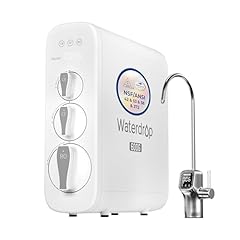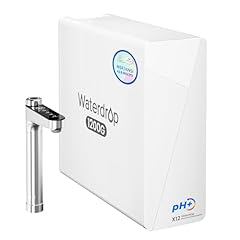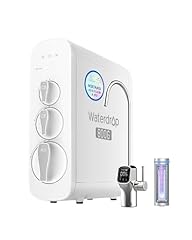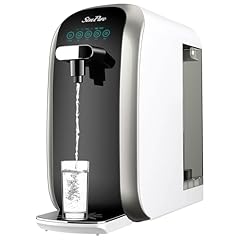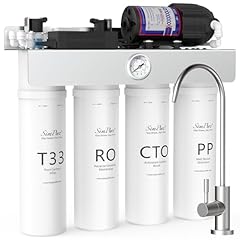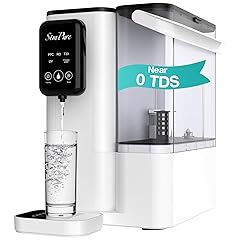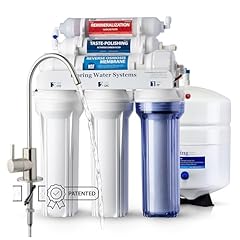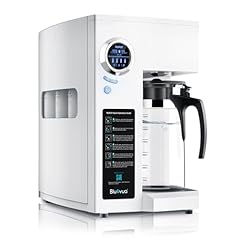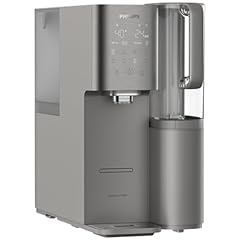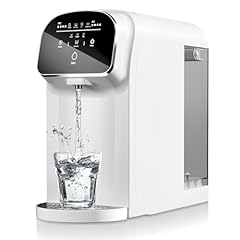-
1
Best Overall Highly efficient 2:1 pure to drain ratio
Highly efficient 2:1 pure to drain ratio Smart LED faucet enhances usability
Smart LED faucet enhances usability Tankless design saves space under sink
Tankless design saves space under sink -
2
 1200 GPD fast flow for high water demand.
1200 GPD fast flow for high water demand. 11-stage filtration ensures superior water purity.
11-stage filtration ensures superior water purity. Alkaline mineral addition improves water quality.
Alkaline mineral addition improves water quality. -
3
 Fast 800 GPD water flow rate
Fast 800 GPD water flow rate Tankless design saves under-sink space
Tankless design saves under-sink space Smart faucet with LED purifier
Smart faucet with LED purifier -
4
Popular No installation needed, easy to set up.
No installation needed, easy to set up. High 4:1 pure to drain water ratio.
High 4:1 pure to drain water ratio. Certified for safety and efficiency.
Certified for safety and efficiency. -
5
Hot Deal High water output with 400 GPD capacity.
High water output with 400 GPD capacity. Advanced 8-stage filtration ensures near 0 TDS.
Advanced 8-stage filtration ensures near 0 TDS. Built-in pump for consistent water pressure.
Built-in pump for consistent water pressure. -
6
 Delivers near zero TDS for pure water.
Delivers near zero TDS for pure water. Fast filtering with 300 gallons per day.
Fast filtering with 300 gallons per day. Portable design for easy countertop use.
Portable design for easy countertop use. -
7
 pH+ remineralization for better tasting water.
pH+ remineralization for better tasting water. NSF certified for reliable water filtration.
NSF certified for reliable water filtration. Easy under-sink installation and maintenance.
Easy under-sink installation and maintenance. -
8
 User-friendly countertop setup with no installation required.
User-friendly countertop setup with no installation required. 6-stage purification ensures exceptionally clean water.
6-stage purification ensures exceptionally clean water. Portable design perfect for home or office use.
Portable design perfect for home or office use. -
9
 Advanced filtration with UV for cleaner water.
Advanced filtration with UV for cleaner water. Multiple temperature settings for personalized use.
Multiple temperature settings for personalized use. Instant boiling feature for quick hot water.
Instant boiling feature for quick hot water. -
10
Best Affordable Easy to set up with no installation.
Easy to set up with no installation. High water efficiency with 5:1 pure to drain ratio.
High water efficiency with 5:1 pure to drain ratio. Built-in UV filter for extra purification.
Built-in UV filter for extra purification.
Overview of Reverse Osmosis Water Filter
In today's world, ensuring access to clean and safe drinking water is more important than ever. Reverse osmosis water filters have become a popular choice for many households, providing an effective way to remove impurities and contaminants from tap water. These systems use a multi-stage filtration process to deliver pure, great-tasting water right from your kitchen faucet. Whether you're looking to improve the quality of your drinking water, reduce dependency on bottled water, or simply want peace of mind knowing your family is consuming cleaner water, a reverse osmosis water filter can be an excellent investment for your home.Top Reverse Osmosis Water Filter
• Waterdrop G3 Tankless Reverse Osmosis System• Waterdrop X12 1200 GPD Tankless RO System• Waterdrop G3P800 Tankless RO SystemFAQ
Q: How does a reverse osmosis water filter improve water quality?
A: A reverse osmosis water filter enhances water quality by removing impurities, such as heavy metals, chlorine, and sediments. This process not only makes your water taste better but also ensures it's safer for drinking and cooking, giving you peace of mind about what you consume.
Q: Is a reverse osmosis water filter effective in removing fluoride?
A: Yes, a reverse osmosis water filter is highly effective at removing fluoride from water. This makes it a popular choice for those concerned about the potential health effects of fluoride, offering a reliable way to reduce its presence in your water supply.
Q: Can a reverse osmosis water filter save money compared to bottled water?
A: Absolutely, using a reverse osmosis water filter can significantly reduce your reliance on bottled water, leading to substantial savings over time. By investing in a reverse osmosis system, you not only cut costs but also contribute to reducing plastic waste.
Q: What are the benefits of using a reverse osmosis water filter for cooking?
A: Cooking with water from a reverse osmosis water filter can enhance the flavors and quality of your meals. By removing contaminants and impurities, the water used in cooking becomes purer, which can improve the taste and texture of food and beverages.
Q: How does a reverse osmosis water filter contribute to environmental sustainability?
A: A reverse osmosis water filter promotes environmental sustainability by reducing the need for single-use plastic bottles. By filtering your own water at home, you decrease plastic waste and lower your carbon footprint, making it an eco-friendly choice for conscientious consumers.

